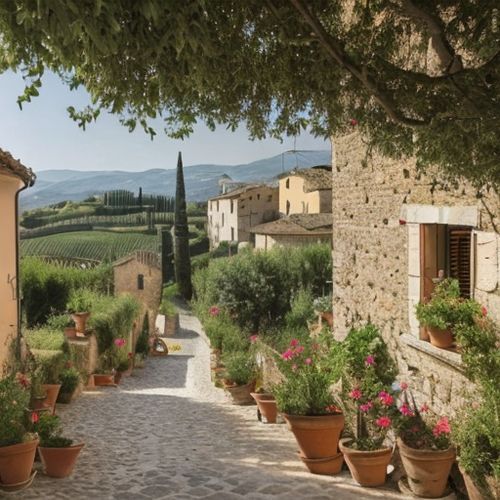The Italian countryside is experiencing an unexpected renaissance, fueled not by tourists seeking short-term escapes but by a growing tribe of digital nomads and remote workers. Long-term rentals of rural villas, farmhouses, and agriturismos have surged by 300% over the past two years, according to data from Italian property platforms. This seismic shift reflects a deeper transformation in how people choose to live and work, with picturesque villages in Tuscany, Puglia, and Sicily becoming unlikely hubs for location-independent professionals.
The pandemic may have accelerated the trend, but the roots of this migration run deeper. As high-speed internet reaches even the most remote olive groves, the romantic notion of working from a sun-drenched stone terrace has become a practical reality. Property managers report that bookings of six months or longer now dominate their inquiries, with many guests opting to extend their stays indefinitely. "We're seeing architects from Berlin, software developers from Stockholm, and financial analysts from London treating our farmhouses as both office and home," says Marco Bellini, whose family has operated vacation rentals in Umbria for three generations.
What began as a temporary solution during lockdowns has evolved into a lifestyle movement. The typical long-term guest isn't seeking a holiday experience but rather integration into local communities. They shop at weekly markets, enroll children in village schools, and participate in olive harvests. This blurring of lines between visitor and resident is reshaping rural economies. Bakery owners who once relied on summer tourism now enjoy steady year-round customers, while abandoned workshops find new life as co-working spaces.
The infrastructure to support this new population is developing organically. In the Le Marche region, a network of "digital nomad-friendly" villages has emerged, offering bundled services that include housing, coworking memberships, and Italian language lessons. Local governments, recognizing the economic potential, are adapting zoning laws and investing in fiber optic expansion. "These remote workers bring disposable income without straining resources like mass tourism does," explains urban planner Giulia Conti. "They revive empty homes but don't require new hotels or roads."
Cultural exchange flows both ways in this arrangement. While foreigners gain an authentic Italian experience, locals benefit from skills-sharing and fresh perspectives. Former shepherds now lead coding workshops, while retired schoolteachers offer immersive history tours. The phenomenon has sparked a minor reversal of Italy's brain drain, with some young Italians returning to their ancestral villages - this time with remote jobs that allow them to preserve their careers while reconnecting with roots.
Property owners are rethinking traditional models to accommodate this demand. Many are shifting from nightly rentals to seasonal or annual contracts, often furnishing homes with ergonomic chairs and upgrading internet capabilities. Some innovative agreements include barter systems - reduced rent in exchange for helping with vineyard work or teaching English to local children. The most sought-after properties aren't the most luxurious, but those with reliable infrastructure and authentic character. "A stable Wi-Fi connection matters more than a swimming pool," notes rental platform founder Sofia Russo. "Our clients want to wake up to roosters crowing but still join morning video calls with New York."
This trend presents both opportunities and challenges for Italy's rural communities. While depopulated towns regain vitality, there are concerns about maintaining cultural identity and preventing displacement. Some municipalities have implemented policies ensuring a percentage of housing remains affordable for locals. The emerging model suggests a middle path between overtourism and abandonment - one where global connectivity allows ancient villages to thrive without losing their souls. As the world reevaluates the necessity of urban offices, Italy's countryside offers a compelling alternative that blends productivity with la dolce vita.
The long-term implications could reshape Italy's economic geography. Regions once considered "left behind" are becoming magnets for creative professionals seeking affordable living costs amidst stunning landscapes. Universities in Bologna and Florence report increased interest in their Italian language programs from remote workers planning extended stays. Even the traditional afternoon siesta is adapting, with coworking spaces remaining open through midday to accommodate different time zones. What began as a pandemic contingency has revealed an unexpected future - one where medieval hill towns become nodes in global digital networks while preserving their timeless charm.

By Elizabeth Taylor/Apr 11, 2025

By Christopher Harris/Apr 11, 2025

By William Miller/Apr 11, 2025

By Rebecca Stewart/Apr 11, 2025

By Megan Clark/Apr 11, 2025

By Grace Cox/Apr 11, 2025

By Benjamin Evans/Apr 11, 2025

By Victoria Gonzalez/Apr 11, 2025

By Thomas Roberts/Apr 11, 2025

By James Moore/Apr 11, 2025

By George Bailey/Apr 11, 2025

By Lily Simpson/Apr 11, 2025

By Megan Clark/Apr 11, 2025

By Jessica Lee/Apr 11, 2025

By Olivia Reed/Apr 11, 2025

By George Bailey/Apr 11, 2025

By Emily Johnson/Apr 11, 2025

By Victoria Gonzalez/Apr 11, 2025

By William Miller/Apr 11, 2025

By Grace Cox/Apr 11, 2025